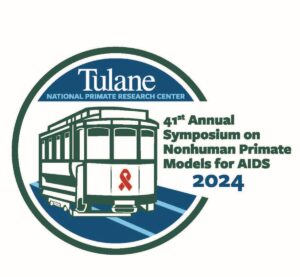
The 41st Annual symposium on Nonhuman Primate Models for AIDS is under way in New Orleans this week, and the Washington National Primate Research center is well-represented by both speakers and attendees.
The WaNPRC contingent consists of session speakers, poster presenters and attendees. “This meeting is the only one of its kind in the world,” said Dr. Kristina Adams Waldorf, Interim Director of Research at WaNPRC. “The symposium includes research presentations on HIV, HIV-like viruses, such as SARS-CoV-2, influenza, Zika, Valley Fever and others that nonhuman primates serve as a close model to human infection that can be used in nonhuman primates to model AIDS, With 38 million people currently estimated to be living with HIV worldwide, the need to develop better treatments and interventions to prevent and/or cure HIV infection remains critical.”
Dr. Chris Peterson, a WaNPRC Affiliate with the Fred Hutch Cancer Center, is presenting on research targeting an HIV-like virus in macaques with (chimeric antigen receptor) CAR-T cells that are specific for a viral protein. “A major challenge to cure HIV is that antiretroviral therapy suppresses the virus to the point that it is essentially invisible to the immune system, but is not curative,” Dr. Peterson said. “What we’re trying to do here is extend how long our CAR T-cells work in the body, so that they more time to locate these rare, infected target cells, leading to a cure.”
Also presenting is Professor Donald Sodora, PhD, Adjunct Professor of Global Health, on the impacts of an HIV-like virus on the liver of nonhuman primates.
WaNPRC was important in establishing the symposium which began as a way for all seven NPRCs to meet and discuss research on the AIDS pandemic using nonhuman primates. At the time, primates were the only animal model that could be infected with a virus that was similar to HIV and develop AIDS symptoms.
“Back then, the NPRCs had been around for about 10-15 years, and were mostly focused on neurosciences,” said WaNPRC Director Dr. Deb Fuller. “But several scientists in infectious diseases at WaNPRC and others at Tulane first showed that old world monkeys (rhesus macaques at Tulane and pigtails at WaNPRC) could be infected with SIV. This launched a huge influx of funding from the NIH into the NPRCs to lead research in NHPs on AIDS and to this date, NIAID is still a major contributor to the P51 and U42 center grants that each NPRC is funded under to support their robust AIDS research programs.”
and has become a meeting place for a large number of scientists and Early-Stage Investigators, many of whom will give their first presentations.
One WaNPRC presenter is Orlando Cervantes, a graduate student in the Adams Waldorf Laboratory. He’ll be sharing his findings on how pandemic influenza infections during the third trimester of pregnancy damage the placenta by provoking a strong immune response.
“Scientists and doctors still don’t fully grasp the ways influenza infection can lead to stillbirth or preterm birth in pregnant women,” said Orlando. “By better understanding the placenta’s response to a maternal influenza infection, we can get clues on how that can compromise placental integrity and hurt the developing fetus. I’m very excited to share these findings because they can encourage other scientists to begin using NHP models to study the interaction between pregnancy and other illnesses/infections.”
The symposium follows on the heels of the HIV Vaccine Trials Network Early Stage Investigator conference, which also took place at the same location. The conference aimed at early-stage investigators (ESIs) specializing in translational HIV research in non-human primates (NHPs) and clinical HIV and TB research is set to offer participants valuable opportunities for professional growth. Attendees will gain insights into their potential contributions to the field and receive support in achieving key career milestones. Previous participants have reported that the event enhanced their skills and knowledge, while also providing a platform for building new collaborations.
Several WaNPRC researchers will have posters at the meeting including Director Deborah Fuller, Associate Director of Research Dr. Kristina Adams Waldorf, and Dr. Charlotte Hotchkiss, D.V.M, Ph.D. As well as the following:
- Megan O’Connor – HIV/COVID-19 and/or HIV/ZIKV co-infection
- Chris Peterson – HIV
- Serena deBanco – HIV (scholarship recipient)
- Megan Fredericks – Valley Fever
The symposium concludes October 25.